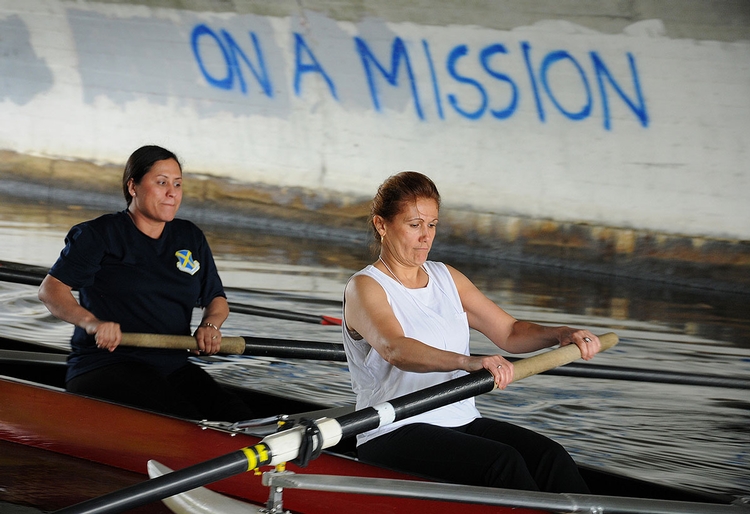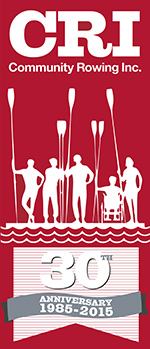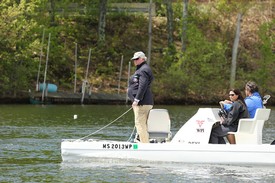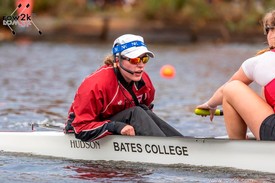row2k Features
Bringing Veterans into the Rowing Community


CRI veterans program members on the water (photo: Debee Tlumacki)
When the plane touches down on home soil for the final time, the combats boots come off, and the uniform is hung up, many veterans must make the challenging transition to civilian life. While US military offers a myriad of ways to make that transition as smooth as possible, rejoining civilian society can still be wrought with stress, uncertainty, and loneliness.
Community outreach programs have become more prevalent among rowing clubs throughout the United States in recent years, and fortunately, that has included expanding interest in veterans rowing. The sport is a perfect fit for the military population. The basic philosophy of rowing—working together as a unit for a common goal—is also one of the principles that defines military service. It's only natural that the two worlds would combine in such a complimentary manner.
"The teamwork aspect of rowing is very familiar to the veteran population, and that familiarity is one of the biggest points I bring up when introducing new vets into the program," said Marizia Lopez, military outreach coordinator at Community Rowing, Inc. "One of the more important parts of the program is forming that team bond, and striving together in the boat and supporting each other as that team. The rowing is kind of secondary."
Lopez, a veteran herself, was a participating rower in the CRI program before being appointed to her current leadership position. She credits her ability to even serve in her role to the time she spent in boats with her veteran peers.
 "I'm a military veteran who has PTSD (post traumatic stress disorder), and I struggled when I started here," she said. "There were a lot of things I had to learn to cope with that could pop up during a practice."
"I'm a military veteran who has PTSD (post traumatic stress disorder), and I struggled when I started here," she said. "There were a lot of things I had to learn to cope with that could pop up during a practice."
When those things did pop up, it was her team that had her back. "I remember I was in an eight, and my pair partner, Cheryl, all of a sudden started calling cadence behind me: '1…2..3...catch, 1...2..3...catch,' because she knew I was drifting out of focus, and she just knew where I was, and what I needed," Lopez said. "I come to find later that she also has PTSD, and could just pick up from watching my back where I was in that moment."
Lopez says the common experience of combat duty makes socializing with the group a little easier. "PTSD is kind of hard to explain, so when you're around people who know what you're going through, and are going through it themselves, you don't have to keep explaining it, they just know."
In 2010 when CRI launched the first military veterans rowing program in the USA, the goal was simple: give back to the veteran population by offering the opportunity to participate as a group in the titular rowing "community."
In its fledgling stages, attracting veterans to the program proved difficult. It can be hard enough getting adults to try a new activity, but when stressors of civilian life adjustments, work, school, injury, or possible PTSD or traumatic brain injuries (TBI), the easier road is the one not traveled at all.
"They're a challenging population to recruit at first," said Ellen Minzner, Director of Outreach at CRI. "They're coming back from their terms of service, they might be injured or working through something psychologically, and just have other things besides rowing on their plate."
CRI uses a high challenge/high support pedagogy for their outreach programs, so new athletes—be they veterans, cancer survivors, at-risk youth, or adaptive rowers—can tackle the strange, demanding sport in an environment where all their coaches constantly strive to eliminate any and all potential barriers to success.
"One of the goals we had when starting the program was to learn what those individual barriers were to participation, like lack of transportation, or unemployment, and figuring out ways around those issues," said Minzner. "Working within the CRI community, we found veteran rowers consistent rides to the boathouse, were able to get them jobs teaching CPR to our staff and other employment opportunities at the boathouse, and one of them enjoyed the sport enough that he got a job coaching a local high school team."
Like with many outreach programs at CRI, rowing is merely a catalyst, the facilitator for other great work to happen. With the veterans rowing program, that catalyst just happens to embody the very atmosphere where participants picked up the "veteran" designation in the first place.
The physiological and social benefits brought about by the military outreach program at CRI are evident. Perhaps less obvious is the potentially life-saving ways such programs can impact the military community.
The US Department of Veterans Affairs estimates that at least 31 percent of the veteran population suffers from PTSD as a result of their service. Much like depression, PTSD can lead to or exacerbate other health conditions including diabetes, obesity, cardiovascular disease, as well as drug and alcohol abuse.
Recent studies show that exercise helps curtail the symptoms of posttraumatic stress disorder. Akin to the research on the positive benefits of exercise on symptoms of depression, exercise can help boost the stress hormone cortisol, which ironically, is extremely low in sufferers of PTSD. When those cortisol levels are brought up, symptoms of the condition are decreased. Exercise can also help improve quality of sleep, which is known to be a major issue for sufferers of PTSD. While many forms of exercise can produce these positive benefits, rowing is a particularly good option. Due to its repetitive, non-impact nature, veterans can exercise without fear of an unknown surprise triggering an unwanted response.
Just as CRI's military program has grown to now include a women's group, a racing team, and a squad working in partnership with Wounded Warriors, veterans rowing programs have also expanded throughout the country. That growth is slated to continue, as USRowing has joined in the mission of providing access to rowing to the nation's returning service members.
With the Freedom Rows initiative, USRowing pairs VA hospitals with rowing clubs in target cities across the country, including the Longmont Sculling Club in Denver, the Raleigh Rowing Center, OKC Riversport in Oklahoma City, Los Gatos Rowing Club in Palo Alto, the San Diego Rowing Club, and the Detroit Boat Club. The project helps provide grant funding to these clubs to expand rowing opportunities to disabled veterans and other military populations by training members of both the VA and coaching communities in adaptive rowing, bolstering participation numbers of disabled veterans and other service members, and facilitating the development of FISA-standard adaptive programs.
For clubs looking to reach out and engage veterans within their community, Marizia Lopez suggests approaching the project with a healthy amount of patience.
"Sometimes, the expectation is that these clubs are going to start this program, and the veterans are going to show up, and be consistent," she said. "Administrators and coaches have to understand that when you're dealing with military vets, PTSD will play a big role. Consistency will be a problem. People will struggle with getting out of the house and showing up.
"Checking in with participants and telling them that they're needed is a big deal," she said. "Making them know you want them to be there and their team needs them to be there can make the biggest difference in the world."
Community outreach programs have become more prevalent among rowing clubs throughout the United States in recent years, and fortunately, that has included expanding interest in veterans rowing. The sport is a perfect fit for the military population. The basic philosophy of rowing—working together as a unit for a common goal—is also one of the principles that defines military service. It's only natural that the two worlds would combine in such a complimentary manner.
"The teamwork aspect of rowing is very familiar to the veteran population, and that familiarity is one of the biggest points I bring up when introducing new vets into the program," said Marizia Lopez, military outreach coordinator at Community Rowing, Inc. "One of the more important parts of the program is forming that team bond, and striving together in the boat and supporting each other as that team. The rowing is kind of secondary."
Lopez, a veteran herself, was a participating rower in the CRI program before being appointed to her current leadership position. She credits her ability to even serve in her role to the time she spent in boats with her veteran peers.
 "I'm a military veteran who has PTSD (post traumatic stress disorder), and I struggled when I started here," she said. "There were a lot of things I had to learn to cope with that could pop up during a practice."
"I'm a military veteran who has PTSD (post traumatic stress disorder), and I struggled when I started here," she said. "There were a lot of things I had to learn to cope with that could pop up during a practice."When those things did pop up, it was her team that had her back. "I remember I was in an eight, and my pair partner, Cheryl, all of a sudden started calling cadence behind me: '1…2..3...catch, 1...2..3...catch,' because she knew I was drifting out of focus, and she just knew where I was, and what I needed," Lopez said. "I come to find later that she also has PTSD, and could just pick up from watching my back where I was in that moment."
Lopez says the common experience of combat duty makes socializing with the group a little easier. "PTSD is kind of hard to explain, so when you're around people who know what you're going through, and are going through it themselves, you don't have to keep explaining it, they just know."
In 2010 when CRI launched the first military veterans rowing program in the USA, the goal was simple: give back to the veteran population by offering the opportunity to participate as a group in the titular rowing "community."
In its fledgling stages, attracting veterans to the program proved difficult. It can be hard enough getting adults to try a new activity, but when stressors of civilian life adjustments, work, school, injury, or possible PTSD or traumatic brain injuries (TBI), the easier road is the one not traveled at all.
"They're a challenging population to recruit at first," said Ellen Minzner, Director of Outreach at CRI. "They're coming back from their terms of service, they might be injured or working through something psychologically, and just have other things besides rowing on their plate."
CRI uses a high challenge/high support pedagogy for their outreach programs, so new athletes—be they veterans, cancer survivors, at-risk youth, or adaptive rowers—can tackle the strange, demanding sport in an environment where all their coaches constantly strive to eliminate any and all potential barriers to success.
"One of the goals we had when starting the program was to learn what those individual barriers were to participation, like lack of transportation, or unemployment, and figuring out ways around those issues," said Minzner. "Working within the CRI community, we found veteran rowers consistent rides to the boathouse, were able to get them jobs teaching CPR to our staff and other employment opportunities at the boathouse, and one of them enjoyed the sport enough that he got a job coaching a local high school team."
Like with many outreach programs at CRI, rowing is merely a catalyst, the facilitator for other great work to happen. With the veterans rowing program, that catalyst just happens to embody the very atmosphere where participants picked up the "veteran" designation in the first place.
The physiological and social benefits brought about by the military outreach program at CRI are evident. Perhaps less obvious is the potentially life-saving ways such programs can impact the military community.
The US Department of Veterans Affairs estimates that at least 31 percent of the veteran population suffers from PTSD as a result of their service. Much like depression, PTSD can lead to or exacerbate other health conditions including diabetes, obesity, cardiovascular disease, as well as drug and alcohol abuse.
Recent studies show that exercise helps curtail the symptoms of posttraumatic stress disorder. Akin to the research on the positive benefits of exercise on symptoms of depression, exercise can help boost the stress hormone cortisol, which ironically, is extremely low in sufferers of PTSD. When those cortisol levels are brought up, symptoms of the condition are decreased. Exercise can also help improve quality of sleep, which is known to be a major issue for sufferers of PTSD. While many forms of exercise can produce these positive benefits, rowing is a particularly good option. Due to its repetitive, non-impact nature, veterans can exercise without fear of an unknown surprise triggering an unwanted response.
Just as CRI's military program has grown to now include a women's group, a racing team, and a squad working in partnership with Wounded Warriors, veterans rowing programs have also expanded throughout the country. That growth is slated to continue, as USRowing has joined in the mission of providing access to rowing to the nation's returning service members.
With the Freedom Rows initiative, USRowing pairs VA hospitals with rowing clubs in target cities across the country, including the Longmont Sculling Club in Denver, the Raleigh Rowing Center, OKC Riversport in Oklahoma City, Los Gatos Rowing Club in Palo Alto, the San Diego Rowing Club, and the Detroit Boat Club. The project helps provide grant funding to these clubs to expand rowing opportunities to disabled veterans and other military populations by training members of both the VA and coaching communities in adaptive rowing, bolstering participation numbers of disabled veterans and other service members, and facilitating the development of FISA-standard adaptive programs.
For clubs looking to reach out and engage veterans within their community, Marizia Lopez suggests approaching the project with a healthy amount of patience.
"Sometimes, the expectation is that these clubs are going to start this program, and the veterans are going to show up, and be consistent," she said. "Administrators and coaches have to understand that when you're dealing with military vets, PTSD will play a big role. Consistency will be a problem. People will struggle with getting out of the house and showing up.
"Checking in with participants and telling them that they're needed is a big deal," she said. "Making them know you want them to be there and their team needs them to be there can make the biggest difference in the world."
SUPPORT ROW2K
If you enjoy and rely on row2k, we need your help to be able to keep doing all this. Though row2k sometimes looks like a big, outside-funded operation, it mainly runs on enthusiasm and grit. Help us keep it coming, thank you! Learn more.
If you enjoy and rely on row2k, we need your help to be able to keep doing all this. Though row2k sometimes looks like a big, outside-funded operation, it mainly runs on enthusiasm and grit. Help us keep it coming, thank you! Learn more.
Comments | Log in to comment |
There are no Comments yet
| |
Rowing Features
In the Driver's Seat, with Olivia Seline
April 23, 2024
This Week's Best of Rowing on Instagram 4/20/2024
April 20, 2024
In the Driver's Seat, with Lizzie Johnston
April 16, 2024
This Week's Best of Rowing on Instagram 4/13/2024
April 13, 2024
Rowing Headlines
2024 Inaugural CRCA Athletes to Watch
March 13, 2024
World Rowing suspends Serbian Rowing Federation over financial debts
January 23, 2024
National Rowing Hall of Fame ® Class of 2023 Announced
October 5, 2023
Advertiser Index
- Bont Rowing
- Calm Waters Rowing
- Concept 2
- Craftsbury Sculling
- The Crew Classic
- CrewLAB
- Croker
- Dad Vail Regatta
- Durham Boat Co.
- Empacher
- Faster Masters
- Filippi
- Fluidesign
- h2row.net
- HUDSON
- Live2Row Studios
- Nielsen-Kellerman
- Oak Ridge RA
- Peinert Boat Works
- Pocock Racing Shells
- Race1 USA
- Rockland Rowing Masters Regatta
- RowKraft
- Rubini Jewelers
- Vespoli USA
- WinTech Racing
Get Social with row2k!
Get our Newsletter!
Enter your email address to receive our weekly newsletter.
Support row2k!
Advertiser Index
- Bont Rowing
- Calm Waters Rowing
- Concept 2
- Craftsbury Sculling
- The Crew Classic
- CrewLAB
- Croker
- Dad Vail Regatta
- Durham Boat Co.
- Empacher
- Faster Masters
- Filippi
- Fluidesign
- h2row.net
- HUDSON
- Live2Row Studios
- Nielsen-Kellerman
- Oak Ridge RA
- Peinert Boat Works
- Pocock Racing Shells
- Race1 USA
- Rockland Rowing Masters Regatta
- RowKraft
- Rubini Jewelers
- Vespoli USA
- WinTech Racing

















